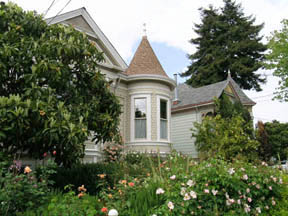



Home
Top 10
By the Numbers
Arguments
News
Contact
Links
Endorsements

NEBA Recommends
Voters must Choose between the mayor's and the citizen's measure regarding landmark preservation. The NEBA Board of Directors has voted to support the citizen's version listed on the ballot at Measure J. It proposes to re-adopt and update most provisions of Berkeley's 1974 Landmarks Preservation Ordinance and pre-empt an alternate measure proposed by Mayor Bates and six members of the City Council. Measure J maintains the authority of the City's Landmarks Preservation Commission, maintains citizen participation in demolition decisions, creates clear timelines to conform to state permit streamlining guidelines and other suggestions by the State, limits the power of speculators to demolish historic structures and negatively impact neighborhoods, and pre-empts the alternate proposal's imposition of substantial permit requirements and costs to be imposed on ordinary homeowners making exterior repairs. Opponents claim that they care more about historic and neighborhood preservation yet more buildings would be demolished under the other initiative. NEBA's Board of Directors SUPPORT MEASURE J.Here's what's at stake if the Citizen's Landmark Preservation Ordinance fails:
- The status of downtown landmark buildings will be systematically
reevaluated with the goal of rescinding their protected status as
landmarks, permitting demolition and replacement
- Neighborhoods would be shut out of any process to save important
contributing buildings
- Familiar Neighborhood shopping centers may be replaced by taller spec development
Measure J — LPO 2006
The LPO 2006 initiative will prevent repeal of Berkeley's grassroots 1974 Landmarks Preservation Ordinance (LPO). It is the only option to Mayor Bates' proposed Ordinance which amounts to a special zoning exemption for developers and speculators. The Mayor's proposal has earned the title of "demolition streamlining ordinance" for good reason. Its basic differences from Measure J and the existing LPO are:
The Mayor's proposal would grant developers who wish to demolish any building over 50 years old a two year exemption from the environmental review process that other similar permit requests must go through.
It proposes to do this by an invention termed RFD (Request for Determination). This is not an actual assessment but a cursory review with minimal research. The reason such a review is needed, according to City Hall, is California's Permit Streamlining Act (PSA). Only problem is the PSA requires nothing of the sort. The PSA and LPO have been law for 30 years with no conflicts, none. So why then, is Mayor Bates' spending so much time on a revision proposal? In a word: demolitions.The Mayor's proposal would limit the public and Landmarks Commission's ability research and nominate a structure for historic value to just 2 months from the time a demolition is applied for, regardless of whether or not the application is ever completed! This and other sections are in violation of California's Environmental Quality Act (CEQA) and would cost the city time and money when these clauses were challenged, and overturned, in court.
The net effect of Bates' proposed ordinance will be a significant increase in the number of demolitions. 2901 Otis for example, where the entire neighborhood signed a petition and prevented out of town speculators from demolishing a Queen Anne to build a tacky three story apartment, would not have been possible under Mayor Bates' plan.
Like fabricated claims regarding PSA the Mayor is also saying the LPO hinders development. With 1,500 new housing units coming on the market it is difficult to find any evidence to support this claim. In fact the LPO is not about development at all, it is about demolition. It is specifically about the demolition of our city's most significant historic resources.
The LPO is also not about housing. Berkeley has many appropriate locations for new housing without demolishing existing historic resources or degrading traditional neighborhoods. By restricting redevelopment in historic neighborhoods Measure J and current LPO increase the chances for improvements on blighted lots.
The LPO is not about permit delays or fees. This is best illustrated by comparing average permit response times between the Landmarks Commission and the City's Planning and Permit Desk. While the Permit Desk is a constant source of complaints, Landmarks decisions are rarely controversial (despite misrepresentations by the Mayor). The vast majority of residential permits are handled exclusively by the Planning and Permit department and the Zoning Adjustment Board.
Finally, the current LPO and Measure J are about good government. They allow for public participation in large redevelopment projects and provide important checks and balances against special interests in City Hall.
Ballot Argument
A YES vote on Measure J maintains citizen participation in decisions regarding demolition permits for historic homes, apartments, schools, libraries and neighborhoods.The Mayor's alternative ordinance, which will become law if this initiative fails, significantly reduces the authority of the Landmarks Preservation Commission (LPC), paves the way for speculators to demolish dozens, possibly hundreds of historic buildings, and severely weakens citizens' rights to participate in decisions affecting their immediate neighborhood.
This Initiative updates the 1974 Landmarks Preservation Ordinance (LPO), which was certified by the State in 2000 as being compliant with state and federal preservation practices. It adds professional qualifications for Landmarks Commissioners and defines stricter criteria for designation of landmarks as recommended by the State Office of Historic Preservation.
Don't be misled by the City Attorney's speculation that this ordinance may violate state law. No credible legal authority, not even the State Office of Planning and Research, supports that interpretation.
The Mayor's proposed ordinance makes it easier to demolish a hundred-year-old Victorian than to repave your driveway, by requiring all permits for exterior maintenance and repairs to be LPC approved. At the same time the Mayor's ordinance expedites demolition permits. This will add hundreds, possibly thousands, to homeowner permit costs, substantially increase the LPC's workload, and delay permits. Homeowners, not developers, will bear the cost.
This Initiative encourages retaining truly affordable housing, that which was built long ago of enduring materials and craftsmanship, by providing time to discuss demolition alternatives. It also encourages environmentally friendly housing by creative reuse of existing buildings, saving the character of Berkeley neighborhoods.
A "Yes" vote preserves your right to participate in decisions affecting your neighborhood and keeps the Mayor's proposal from becoming law. Save Berkeley's neighborhoods -- once they're gone, we can't get them back.
Shirley Dean
Former Berkeley Mayor,
co-founder 1974 LPO
Dean Metzger
President Claremont - Elmwood Neighborhood Assn,
Zoning Adjustments Board Member
Elaine Green
Executive Secretary, Berkeley NAACP,
South Berkeley United We Stand Member
Laurie Bright
President, Council of Neighborhood Associations,
Berkeley Architectural Heritage Assn Board Member,
Former Chair Landmarks Commission
Patti Dacey
Downtown Area Plan Advisory Committee (DAPAC) Member,
Former Landmarks Commissioner,
Secretary, LeConte Neighborhood Assn
Ballot Rebuttal
The argument opposing Measure J employs scare tactics, speculation, and outright untruth to mask its real intention: to facilitate demolitions in historic neighborhoods. The facts paint a different picture:* None of the city's 2 dozen neighborhood associations oppose Measure J and most are actively supporting it.
* Nearly 5 dozen residents spoke before the City Council regarding the LPO with 99% supporting it.
* The State certified the LPO 6 years ago while suggesting changes incorporated into Measure 6.
* In 33 years, no part of the Landmarks Preservation Ordinance has been successfully challenged in court. Much stronger preservation ordinances have been upheld by the courts.
* The Landmarks Commission approved the Mayor's proposal only after the last-minute appointment of political cronies.
* Alleged negative effects of the unapproved and sure-to-be litigated State Prop 90 constitute sheer speculation.
Berkeley's 300 landmarks and structures of merit define our neighborhoods and quality of life. Measure J specifically:
* Preserves your rights to participate in decisions affecting your neighborhood.
* Protects affordable, good-quality rental housing from demolition without public notice or opportunity for comment.
* Protects the environment by encouraging renovation and creative reuse of existing buildings.
* Protects traditional neighborhoods by prioritizing development at appropriate sites.
* Saves homeowners money and time, as LPC won't need to review each and every permit for exterior maintenance and repair, as called for in the alternative proposals.
This is about the future of our city. Once our neighborhoods are gone -- we can't get them back. Vote "Yes" on Measure 6.
www.lpo2006.org
Dona Spring
Berkeley City Council member
Anne Wagley
Former Chair Housing Advisory Commission,
Berkeley Architectural Heritage Board Member
Zelda Bronstein
Former Chair Planning Commission,
Board Member and Past President Thousand Oaks Neighborhood Assn
Jesse Arreguin
Rent Stabilization Board Member,
Housing Advisory Commission Chair,
Former ASUC City Affairs Director
Laurie Bright
Former Chair Landmarks Commission,
Berkeley Architectural Heritage Board Member,
President of The Council of Neighborhood Associations
LPO 2006 - Yes on Measure J
A grassroots initiative designed to keep Berkeley's 32-year old Landmarks Preservation Ordinance on the books.The Berkeley City Council, under pressure from a small group of large-scale real-estate developers, is planning to repeal our moderate and effective LPO. Mayor Bates and Councilmember Capitelli have authored a new ordinance which would severely restrict public comment and reduce the Landmarks Commission to little more than advisory.
There have been just two public hearings, one in February, at which 47 community members spoke to the Council. Forty-one of those speakers were in favor of retaining the current ordinance. Only six spoke in favor of the Mayor?s proposal, and five of those six were not Berkeley residents. All six were developers, real-estate lawyers, or otherwise had a financial interest in the process.
A second public hearing was held in July. After several delays speakers were given 2 minutes each just before 10pm. Over a dozen community members spoke in favor of the current LPO and only 2 real estate interests opposed it. A divided Council passed the Bates' plan despite a complete absence of neighborhood support. Since then the City Council has canceled the planned Nov. 1st implementation pending the public's vote on this initiative. We expect the Council to revert to the draconian May 1st revision should the LPO initiative fail, making it all the more important that we win.
For the past 32 years Berkeley's Landmarks Preservation Ordinance has given neighborhoods a voice in the permit process over demolition of historically significant buildings. If we are denied this voice, demolitions would require only an administrative decision made by the Zoning Adjustments Board and the Planning and Permits staff.
The LPO has prevented many inappropriate demolitions by requiring city staff to take into account all the impacts of a proposed demolition before issuing a permit. It has also focused development away from traditional neighborhoods to more appropriate areas.
For the health of our neighborhoods, the benefit of future generations, and in the interest of democratic government, vote yes on LPO 2006 this November.